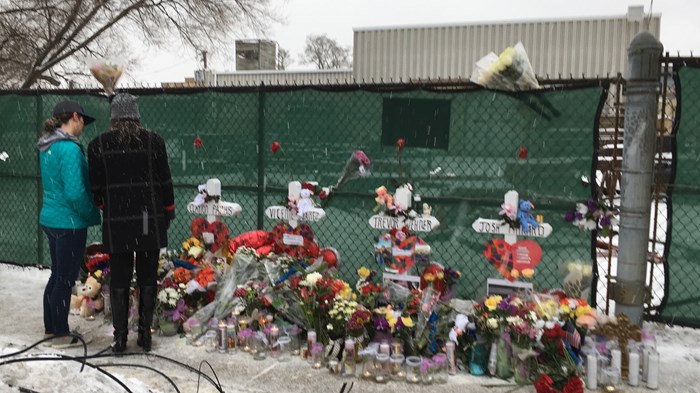6 Ways to Effectively Care for Survivors of the Highland Park Shooting

Yet another tragic and senseless mass shooting has happened, with the latest occuring at the July 4th parade in Highland Park, Illinois. This horrible event has left many grief-stricken and in shock.
Less than 3 years ago, a gunman opened fire killing several people at a factory in Aurora, Illinois, just about an hour away from Monday’s mass shooting in Highland Park. The night of the factory shooting, I was asked to provide trauma care at an Aurora church while they held a prayer vigil for those impacted. Two days later, I joined over 1,000 other people at another prayer vigil in Aurora at the Henry Pratt Company plant near the building where the shooting occurred.
Below are 6 important spiritual and emotional care lessons I learned from the Aurora mass shooting. I share them to help those responding to the Highland Park incident bring more effective care.
God draws near to the brokenhearted.
When Aurora pastor Rev. Dan Hass began the Aurora community service, he echoed the words of the Psalmist, “The LORD is close to the brokenhearted and saves those who are crushed in spirit” (Psalm 34:18). He reminded those present of God’s steadfast, faithful love that is poured out in a particular way on those who have endured suffering. In the wake of crises, people often struggle to make sense of God’s presence or absence. Scripture confirms that God is near, and He is near for those in need following the Highland Park tragedy.
Strength is found in community.
One of the most jarring impacts of mass trauma — both the ones we see coming and the kind we never dreamed of — is isolation. This is most obvious when a sufferer loses a loved one or someone they know, as was the case in this most recent senseless tragedy. But it is no less true when a community shares the same loss. Yet when communities come together to name and grieve a shared loss, the whole community is strengthened. Even online communities can help individuals as they grieve. An example would be joining with like minded people through causes such as the Asian American Christian Collaborativeby signing the statement they first released after the school massacre in Texas. Taking this sort of action unites people from all walks of life with the mission of praying to end senseless acts of gun violence in America.
Lament is required.
When tragedy strikes, it can be tempting for people of faith to rush past the confusion, pain, and loss in an attempt to assure ourselves and others that God has a plan. And while I believe in, and have personally experienced, God’s redemption in the midst of suffering, the reality is that for thorough and authentic healing, people need space to lament. It happened in Aurora, as a community lamented lives that had been cut short too early and grieved for the gifts of those lost that would never be shared with the world. The Bible bears witness to the importance of lament for individuals and for communities facing adversity. In the wake of the Highland Park shooting, let us not forget to lament.
Violence needs a non-violent response.
When life is lost so senselessly, it is natural to want to retaliate. Yet several of the pastors reminded those in attendance that what is needed is forgiveness. When Jesus invited his followers to embrace a standard more radical than the prevailing law of “an eye for an eye,” he was recognizing our natural human temptation to respond to violence with violence. In a violence-plagued nation, we can see that violent responses to violence are futile. When the cruelest atrocities are met with moral integrity and spiritual faithfulness, there is hope for healing.
Physical acts of care bring spiritual comfort.
At least three vans offered coffee and hot chocolate to people attending the vigil in Aurora, reminding me how important it is that people’s most basic physical needs are met during chaotic times of crisis. It matters to those who receive care, and it is also meaningful to those who are offering the care. Aurora resident Greg Zanis has made 26,275 crosses for victims of every national tragedy since the Columbine shooting in 1999. Although the five he made for victims in his own town were the most difficult, the physical act of creating and offering the crosses helped Zanis’ own processing of the tragedy. And when we care for physical needs, we care for peoples’ spiritual needs, too, as our research following a mass shooting in Oregon shows.
Pray and take action.
We all have a role to play in preventing future mass shootings from happening again to more people. Overall, the most important lesson that I learned is that if we want to help those impacted by mass shootings, we have to address our country’s gun problem, too. We as Christians can begin to more deeply live out our calling to love our neighbor by doing all we can to prevent the worst from happening in the first place.
When communities continue to face heartbreaking and senseless tragedies across the country, we can feel helpless. And yet, we can learn from the resilient communities who have faithfully and thoughtfully walked through their own mass traumas. For even more spiritual and emotional care lessons (and practical tools) you can use to help amidst the Highland Park parade shooting, download your free Spiritual First Aid Resource Pack.
Jamie Aten, Ph.D. is the founder and co-director of the Humanitarian Disaster Institute at Wheaton College.
The Better Samaritan is a part of CT's
Blog Forum. Support the work of CT.
Subscribe and get one year free.
The views of the blogger do not necessarily reflect those of Christianity Today.





















